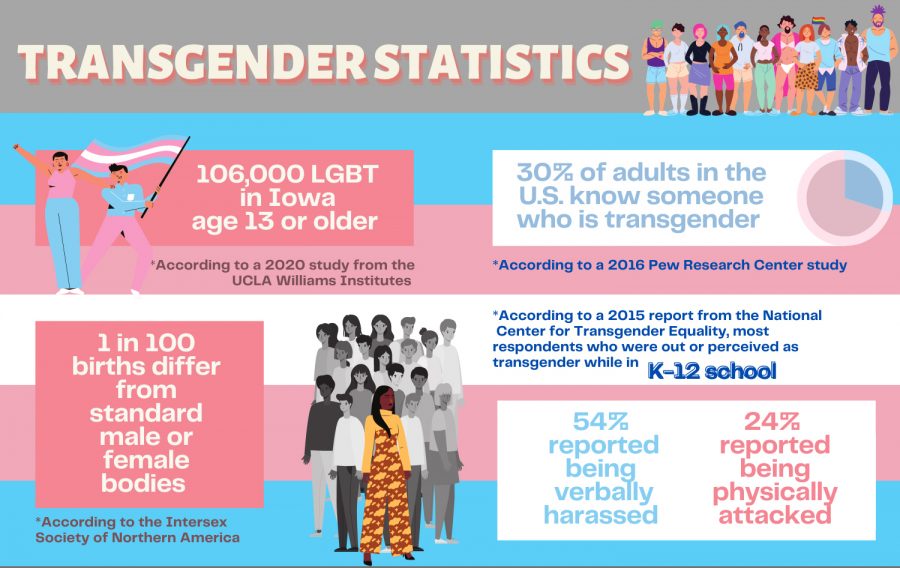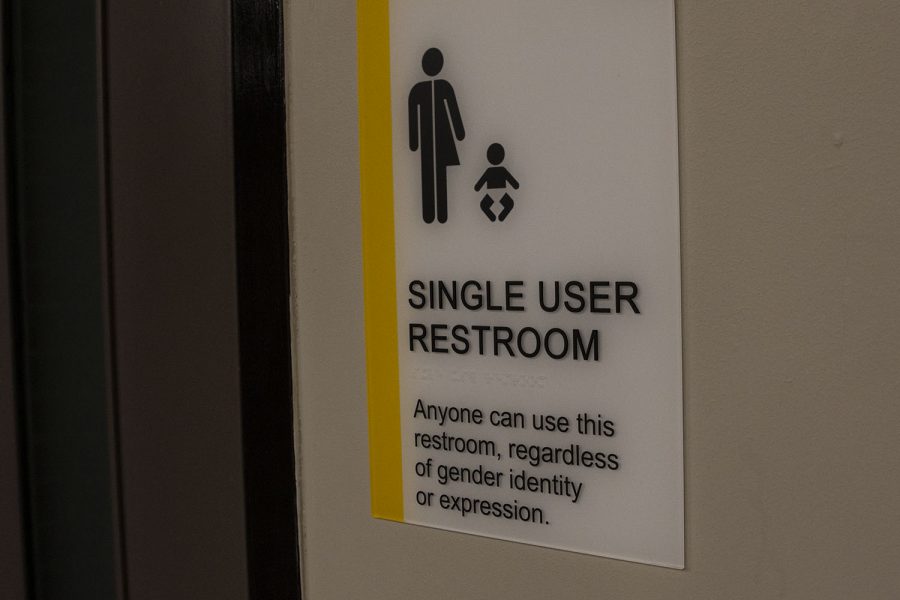Bills that target transgender Iowans pass first legislative hurdles, lawmakers say it’s unlikely to advance
Several bills in the Iowa Legislature have LGBTQ Iowans, allies, and advocates concerned. Some would affect the youngest LGBTQ community members if passed, an unlikely feat.
A single user bathroom is seen in the Main Library on Monday, Feb. 22, 2021. A full list of all single user bathrooms at the University of Iowa can be found online.
February 23, 2021
The way transgender students can navigate in school restrooms, on sports teams, and in the health care system could be changed by several bills in the Iowa Legislature. Though even supporters of anti-transgender bills, such as one that would ban people from using school bathrooms that don’t align with their biological sex, say the legislation is unlikely to pass.
On Feb. 10, Senate File 224, a bill that would prohibit people from using bathrooms in elementary and secondary schools that do not align with their biological sex, passed out of subcommittee. It is one of several bills — House File 187 and 405 contain similar language — proposed this legislative session that would require people to use the bathroom of their biological sex.
Sen. Jim Carlin, R-Sioux City, introduced the bill on Feb. 2.
“The primary purpose of the bill is to protect women and little girls, I’ll just flat out tell you that,” Carlin told The Daily Iowan. “I think the interests of privacy and safety of women and girls should be given priority. It is not an anti-transgender bill. What it is there are men — and this has been shown to be true — that prey upon women and girls in that set of circumstances.”
Carlin said he has spoken to and represented women who were assaulted in restrooms by men, though in those cases he said the perpetrators were not presenting themselves as transgender women. Carlin did not give any real-world examples of people who were assaulted in bathrooms by transgender individuals.
Carlin said in a Feb. 10 subcommittee meeting that he didn’t feel there was enough conversation from the public about the privacy and safety of cisgender women.
But bill detractors point out that transgender people are more likely to experience violence when denied access to the restroom of their gender identity.
“A transgender person is much more likely to be assaulted themselves, putting themselves in dangerous situations. If this bill is passed it would make it even worse,” Sen. Claire Celsi, D-Des Moines, who was also on the subcommittee for the bill, said in response.
In a 2015 report from the National Center for Transgender Equality — which surveyed 27,715 transgender adults in the U.S. in a nonrandom, anonymous, online survey — 59 percent of respondents said they avoided using public restrooms in the prior year themselves because they were afraid of having problems, and 12 percent said they were verbally harassed, physically attacked, or sexually assaulted when accessing a restroom in the last year.

According to the 2019 LGBTQ Teen Study, transgender teenagers experience higher rates of sexual assault than cisgender teens, and transgender and nonbinary students whose bathroom access was restricted experienced higher rates of sexual assault than the average transgender or nonbinary student, according to the LGBTQ Teen Study.
Sen. Jeff Taylor, R-Sioux Center, the third subcommittee member, declined to be interviewed about the bill and told The Daily Iowan that he prefers to discuss controversial bills directly with colleagues and constituents.
Celsi said as soon as the bill was filed, transgender adults and students, parents of transgender kids, counselors, coaches, principals and superintendents reached out in opposition of the bill.
“School is sometimes a transgender child’s only safe place because they can be themselves,” Celsi told the DI. “And if they have trained staff who are sensitive to their predicament at home, that can be their only safe place and a place where they can come out and also use their pronouns of their choice.”
Carlin and Celsi do share two opinions of the bill.
First, they both said this would be difficult to enforce. Carlin said he was not looking for “bathroom police.”
He also acknowledged there could be some instances of confusion. For example, an adult transgender man, Kristian Maul, told the subcommittee members that this bill would require him to use the same restroom as young girls when he volunteers at his daughter’s elementary school.
“This bill would say that I need to use the girl’s restroom when I am there because I am a transgender man, my birth certificate lists me as female, and that is how the bill language reads,” Maul told senators on Feb. 10. “So, I urge you all to oppose this, not just for the absurdity and discrimination and pain that it will cause transgender youth, but just for the fact that the language of the bill simply does not make sense and would produce results that I’m sure no one on the committee or in the public would want a 39-year-old adult man, transgender man such as myself, using the girls restroom at an elementary school.”
Carlin told the DI that in school communities, people are often familiar with each other, suggesting that people would know who is permitted to be using the restroom under this bill or not. He also said separate, gender neutral bathrooms could be a solution for transgender people but did not say that there could be an expectation for transgender people to not comply with the bill.
Additionally, though the bill would require people to use the restroom based on biological sex, there is no mention of how intersex people — those who are not genetically or anatomically male or female — would be affected by this.
Secondly, Carlin and Celsi both said the bill is unlikely to become law.
Though he doesn’t think it will make it out of committee, Carlin said the point of putting this bill forward was to have a conversation about women and girls that may feel uncomfortable or unsafe. Celsi says even proposing these bills is harmful to LGBTQ people.
“This bill is a complete and total waste of time,” Celsi said. “But what it did do was terrify and … greatly upset anyone who knows a transgender person, or who advocates for a transgender person, or who is a transgender person, to the point where you know I’m getting emails saying, just the presence of this bill in our state whether it goes anywhere or not is deeply upsetting and deeply embarrassing.”
Several other bills have raised concern among LGBTQ Iowans. Senate File 167, another bill to recently go through an education subcommittee, would prohibit schools from including gender identity in health curriculum for grades one through six unless the district or accredited nonpublic school obtained written consent from the parent or guardian. Additionally, kindergarten students could not be taught about gender identity at all.
Carlin introduced that bill along with Taylor, Sen. Craig Johnson, R-Independence, Sen. Mike Klimesh, R-Spillville, Sen. Amy Sinclair, R-Allerton, Sen. Ken Rozenboom, R-Oskaloosa, and Sen. Tom Shipley, R-Nodaway.
Some other bills that worry LGBTQ people and advocates have been introduced and some assigned subcommittee groups, but none so far have been assigned a subcommittee meeting date. House File 272 would remove gender identity as a protected class under the Iowa Civil Rights Act. Senate File 80 would require schools to share student’s pronouns with parents upon request. House File 193 would limit transgender youth’s ability to access gender affirming medical care. House File 184 would require students only participate in sports teams of their biological sex, or on co-ed teams.
More than a dozen people wanted to speak at the virtual subcommittee meeting for the bill on gender identity in curriculum on Feb. 15. A majority of speakers voiced opposition to the bill, saying limiting education about gender identity would make school a less safe environment for transgender and nonbinary students, putting them more at risk for bullying and harassment.
“LGBTQ students with inclusive curriculum have better academic and mental health outcomes and are less likely to miss school themselves,” said Damian Thompson, speaking on behalf of Iowa Safe Schools, whose mission is to create safe spaces for LGBTQ youth.
Speakers in opposition of the bill said learning about gender identity benefits cisgender students, because it can help them understand the experiences of transgender and nonbinary people in their community.
Educators also said they didn’t want the state Legislature dictating what can and cannot be taught, instead that should rest with the power of local school boards.
Carlin and other supporters of the bill said parents should be involved in deciding if they want their child to learn about gender identity.
“The question is, should the parents give their written permission [to learn about gender identity]? Why would you not want that?” said Danny Carroll, a lobbyist for The Family Leader, a Christian group. “If in fact, we are concerned about the wellbeing of children, particularly when it comes to gender identity, why wouldn’t we want to make sure that parents are involved?”
Celsi said she heard from educators who provided support to students when they were not receiving support from their own parents regarding gender identity.
“Mr. Carroll made a comment, ‘Nobody loves their children more than a parent,’ which is typically true. However, when a child has gender identity issues going on, sometimes the parent doesn’t understand what is going on and they look to their school system and their support system to be able to help them and that’s exactly what happens,” she said.
Both the bathroom bill and the bill on gender identity in education curriculum have yet to be discussed in the full senate education committee after passing out of subcommittee.



